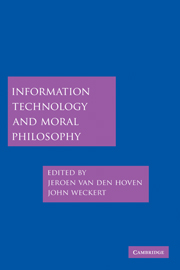Book contents
- Frontmatter
- Contents
- List of Contributors
- Introduction
- 1 Norbert Wiener and the Rise of Information Ethics
- 2 Why We Need Better Ethics for Emerging Technologies
- 3 Information Ethics: Its Nature and Scope
- 4 The Transformation of the Public Sphere: Political Authority, Communicative Freedom, and Internet Publics
- 5 Democracy and the Internet
- 6 The Social Epistemology of Blogging
- 7 Plural Selves and Relational Identity: Intimacy and Privacy Online
- 8 Identity and Information Technology
- 9 Trust, Reliance, and the Internet
- 10 Esteem, Identifiability, and the Internet
- 11 Culture and Global Networks: Hope for a Global Ethics?
- 12 Collective Responsibility and Information and Communication Technology
- 13 Computers as Surrogate Agents
- 14 Moral Philosophy, Information Technology, and Copyright: The Grokster Case
- 15 Information Technology, Privacy, and the Protection of Personal Data
- 16 Embodying Values in Technology: Theory and Practice
- 17 Information Technology Research Ethics
- 18 Distributive Justice and the Value of Information: A (Broadly) Rawlsian Approach
- Select Bibliography
- Index
- References
1 - Norbert Wiener and the Rise of Information Ethics
Published online by Cambridge University Press: 21 July 2009
- Frontmatter
- Contents
- List of Contributors
- Introduction
- 1 Norbert Wiener and the Rise of Information Ethics
- 2 Why We Need Better Ethics for Emerging Technologies
- 3 Information Ethics: Its Nature and Scope
- 4 The Transformation of the Public Sphere: Political Authority, Communicative Freedom, and Internet Publics
- 5 Democracy and the Internet
- 6 The Social Epistemology of Blogging
- 7 Plural Selves and Relational Identity: Intimacy and Privacy Online
- 8 Identity and Information Technology
- 9 Trust, Reliance, and the Internet
- 10 Esteem, Identifiability, and the Internet
- 11 Culture and Global Networks: Hope for a Global Ethics?
- 12 Collective Responsibility and Information and Communication Technology
- 13 Computers as Surrogate Agents
- 14 Moral Philosophy, Information Technology, and Copyright: The Grokster Case
- 15 Information Technology, Privacy, and the Protection of Personal Data
- 16 Embodying Values in Technology: Theory and Practice
- 17 Information Technology Research Ethics
- 18 Distributive Justice and the Value of Information: A (Broadly) Rawlsian Approach
- Select Bibliography
- Index
- References
Summary
To live effectively is to live with adequate information. Thus, communication and control belong to the essence of man's inner life, even as they belong to his life in society.
Norbert WienerSCIENCE, TECHNOLOGY, AND ETHICS
Major scientific and technological innovations often have profound social and ethical effects. For example, in Europe during the sixteenth and seventeenth centuries, Copernicus, Newton, and other scientists developed a powerful new model of the universe. This stunning scientific achievement led to increased respect for science and for the power of human reasoning. During that same era, recently invented printing-press technology made it possible to spread knowledge far and wide across Europe, instead of leaving it, as before, in the hands of a privileged minority of scholars. Inspired by these scientific and technological achievements, philosophers, such as Hobbes, Locke, and Rousseau, re-examined human nature and the idea of a good society. They viewed human beings as rational agents capable of thinking for themselves and acquiring knowledge through science and books. In addition, they interpreted society as a creation of informed, rational citizens working together through social contracts. These philosophical developments laid foundations for ethical theories such as those of Bentham and Kant, and for political changes such as the American Revolution and the French Revolution.
Today, after far-reaching scientific achievements in physics, biology, and cybernetics – and after recent technological advances in digital computing and information networks – philosophers are again rethinking the nature of human beings and of society.
- Type
- Chapter
- Information
- Information Technology and Moral Philosophy , pp. 8 - 25Publisher: Cambridge University PressPrint publication year: 2008
References
- 15
- Cited by



